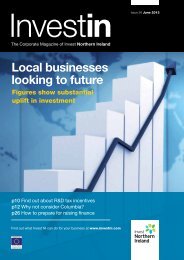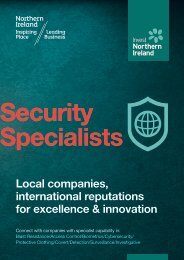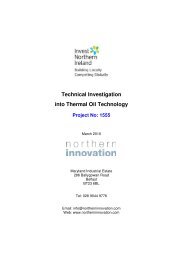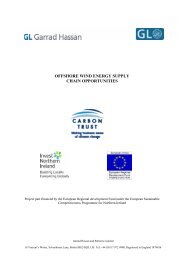Invest NI No Nonsense Guide 11 (PDF) - Invest Northern Ireland
Invest NI No Nonsense Guide 11 (PDF) - Invest Northern Ireland
Invest NI No Nonsense Guide 11 (PDF) - Invest Northern Ireland
Create successful ePaper yourself
Turn your PDF publications into a flip-book with our unique Google optimized e-Paper software.
22rate, you can make the paymentfree of tax and NationalInsurance.Businesses that make vehiclesavailable to employees for theirprivate use must annually reportthe taxable value of the benefitto HM Revenue & Customs onform P<strong>11</strong>D. Employers must alsopay Class 1A National Insuranceon the taxable value of cars andfuel made available to employeesfor their private use. Thereare also VAT rules on businessvehicles (see Next steps below).If your business buys a car,it can claim a capital allowance(see Next steps below). If yourbusiness leases vehicles, the costcan be deducted from taxableprofits.The rules in this area arecomplex. You should checkthe position with HM Revenue& Customs or consult youraccountant.Next steps● See VAT on business vehicles,page 29● See Allowances for equipmentand premises, page 15● See Employed orself-employed?, page 10● Visit www.nibusinessinfo.co.uk/businessvehicles● You must arrange your vehicleexcise duty on any businessvehicles. Contact the Driverand Vehicle Agency:0845 402 4000;www.dvani.gov.uk● HM Revenue & Customs cangive you further informationon business vehicles and tax.Contact the New EmployerHelpline: 0845 60 70 143. Ifyou are self-employed, call theSelf Assessment Helpline:0845 900 0444.● Further information abouttax on business vehicles isavailable on the HM Revenue& Customs website:www.hmrc.gov.uk/cars● For more information read:Using Your Own VehicleFor Work — Information ForEmployees. Contact theHM Revenue & CustomsEmployer Orderline:08457 646 646;www.hmrc.gov.uk/mileageSpecial tax rulesfor the constructionindustryThe Construction IndustryScheme (CIS) provides aset of rules for the paymentof income tax and NationalInsurance if you are in theconstruction industryIn the construction industry,businesses fall into two maincategories: contractors andsubcontractors (though itis possible for a business tobe both a contractor and asubcontractor).A contractor is any personor business that pays othersto carry out constructionwork. (Businesses outsidethe construction sector canbe classified as contractors iftheir construction expenditureaverages more than £1 millionover three years.)Broadly, a subcontractor is anyperson or business that carriesout construction work.Contractors must register withHM Revenue & Customs. Theymust also must verify the taxstatus of subcontractors beforepaying them for the first time— HM Revenue & Customs willdetermine whether the paymentshould be gross or whetherdeductions should be made.The standard rate ofdeduction is 20 per cent. Ahigher rate of 30 per centapplies for subcontractors thatHM Revenue & Customs has notbeen able to verify.Contractors must make amonthly return to HM Revenue &Customs detailing the paymentsmade to all subcontractors.Subcontractors must alsoregister with HM Revenue &Customs. They can apply to bepaid gross by contractors if theymeet turnover, business andcompliance criteria.Next steps● Visit www.nibusinessinfo.co.uk/constructionindustry● You can get further detailson the Construction IndustryScheme from HM Revenue &Customs. Contact0845 366 7899;www.hmrc.gov.uk/cisYour business ratesThe <strong>No</strong>-<strong>No</strong>nsense <strong>Guide</strong>








